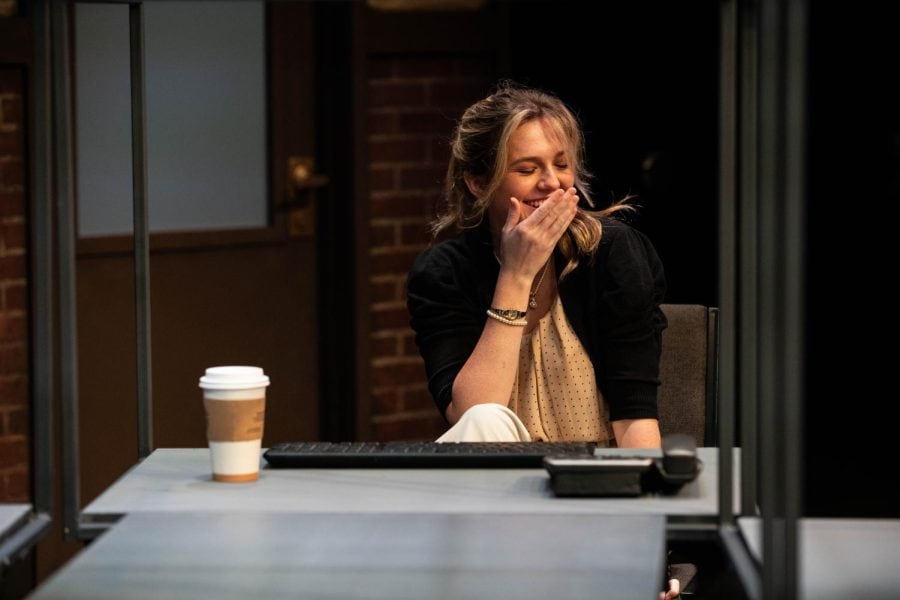Review: “Gloria” begins conversations on ambition and corporate America
September 27, 2022
“Gloria,” a production by the University of Alabama Department of Theatre and Dance, is a dramatic comedy that looks at ambition and what people are willing to do to climb the corporate ladder. The play opened on Sept. 26 and will run through Oct. 2 in the Allen Bales Theatre in Rowand-Johnson Hall.
The play opens with Miles, a summer intern working his last day for an unnamed New York City magazine. Music is playing in the background as Miles watches three editorial assistants prepare to work in an almost robotic and choreographed fashion. After the music stops, it’s revealed that while all three desk assistants are working for what is supposedly one of the best magazines in New York, they don’t have much work to do.
For example, Kendra, one of the desk assistants, has so little work that she has enough time to shop and go on multiple Starbucks runs throughout the workday.
“The play focuses on four characters who by and large don’t have a whole lot to do for their jobs,” said Robert Fuson, a second year graduate student studying directing and the director of the show. “[S]o they spend a lot of their time complaining about their jobs while at the same time being trapped in this hyper competitiveness with each other where the only way to escape these jobs that are very soul crushing to them is to undercut each other.”
The first act is about how easy it is to get stuck chasing ambition. Throughout the play, it is emphasized that for many employees, working at the magazine was supposed to be a “fun thing to do after college” that accidentally turned into their careers. The magazine works each employee to the bone with little to no prospects of promotion due to an editorial board that won’t retire.
Gloria is one such employee. Her job at the magazine has been described as “her life” since she’s been working there for 15 years. Despite her being there for so long, no one likes her, and she doesn’t have any friends.
For example, at the beginning of the play, we hear about a party that she hosted. She spent money on proper food and even hired a bartender, but only four people cared to show up.
Tightly woven between all the serious moments, audience members can laugh at the different characters’ quirky personalities and hilarious banter. The desk assistants laugh and joke about gossip around the office while each assistant is eager to be published by the age of 30.
The entire tone shifts, however, when a shooting takes place in the office. The stage is covered in red as Gloria kills her co-workers one by one.
Fuson’s decision to make the killings conveyed through a kiss of death is one that is both sensitive to audience members and has a way of making it more personal.
“This is more grotesque,” Fuson said. “It feels almost more intimate.”
After the shooting in the first act, the second act as all about who owns the story.
Each character has their own reason for chasing money in exchange for a piece of the story, but it isn’t ever clear who has more of a right to tell their perspective. The surviving employees take different angles on the same incident and believe that they are the only ones deserving of telling the tale. They also believe that the others are undeserving. Only a few times is it mentioned that the shooting was something that happened to all of them collectively.
“There’s also some really good commentary and discussion surrounding the way in which we deal with mass tragedy, which is something that’s continually more and more timely in the U.S. these days,” Fuson said. “It feels like a very good fit for a college age audience as well as people who are struggling to come to grips with how increasingly violent our society is becoming.”
“Gloria” Act II explores different questions that may be raised after a traumatic event, including who can use the tragedy to their own advantage.
“I think that in modern day media, everybody is ready to tell a story or to know all the information about all these big, traumatic experiences,” said Quinn Conrath, a junior majoring in musical theatre who played Lorin. “I think it really is a commentary on that and how desperate people are to get a story about something like this and how sometimes they’re a little blind to the gravity of the situation.”
Marcus Johnson, a senior majoring in musical theatre, played Miles, Shawn and Rashaad in the show and was given the opportunity to share perspective on being nonbinary while on the stage.
“It continues to open people’s mind once they see me. It challenges everything that society has taught them that was right,” Johnson said. “Recently, I’ve been playing around with my femininity and expressing my trans quality and my feminine identity so I’m able to display that on stage.”
“Gloria” is running through Sunday, Oct. 2 at 2 p.m. Tickets cost $10 and can be purchased on the department’s website. For more information on upcoming shows within the Department of Theatre and Dance, visit here.










